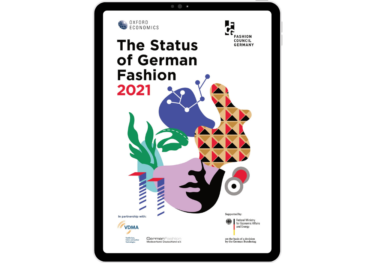Ungated Post | 19 Jan 2021
The Status of German Fashion

This study, the first of its kind, analyses the economic impact of the German fashion industry across the full sweep of the fashion industry’s significant components. In addition, expert interviews with leading CEOs, publishers, PR experts and designers active within the German fashion industry have served as a basis for a detailed SWOT analysis, altogether with the aim to conclude with concrete recommendations for policymakers and industry associations.
“Made in Germany” is a globally recognised seal of quality but despite Germany’s overall importance with regards to global fashion – a leading textiles exporter, at the forefront of innovation for smart textiles, sustainability trends, and textile machinery, as well as featuring one of the largest consumer markets – German fashion has yet to catch-up in terms of international standing. This reports assesses the current status of German fashion, its economic impact and formulates some clear recommendations for policy makers.
Our economic consulting and thought leadership teams are world leaders in quantitative economic analysis and original, evidence-based research, working with clients around the globe and across sectors to build models, forecast markets, run extensive surveys, and evaluate interventions using state-of-the art techniques. Lead consultants on this project were:
Oxford Economics’ team is expert at applying advanced economic tools that provide valuable insights into today’s most pressing business, financial, and policy issues.
To find out more about our capabilities, contact:
EMEA
Corinna Hoyer
+49 (0)69 96 758 658
Email
Americas
Hamilton Galloway
+1 (646) 503 3068
Email
Asia
Rhianne Clark
+65 6850 0112
Email
Related Services

Post
The economic impact of abandoning the WTO
Oxford Economics have been commissioned by the International Chamber of Commerce (ICC) to provide an independent assessment of the economic impact of WTO dissolution. This report details our findings and the assumptions underpinning our analysis.
Find Out More
Post
The economic impact of the sports activities of public service media
This study shows how the sports activities of public service media supported €4.5 billion of GDP and 57,000 jobs across 31 European countries in 2022. The report also highlights wider economic benefits of public service media sports coverage, such as the way in which it leverages sponsorship income for sports bodies.
Find Out More
Post
Global Trade Education: The role of private philanthropy
Global trade can amplify economic development and poverty alleviation. Capable leaders are required to put in place enabling conditions for trade, but currently these skills are underprovided in developing countries. For philanthropists, investing in trade leadership talent through graduate-level scholarships is an opportunity to make meaningful contributions that can multiply and sustain global economic development.
Find Out More